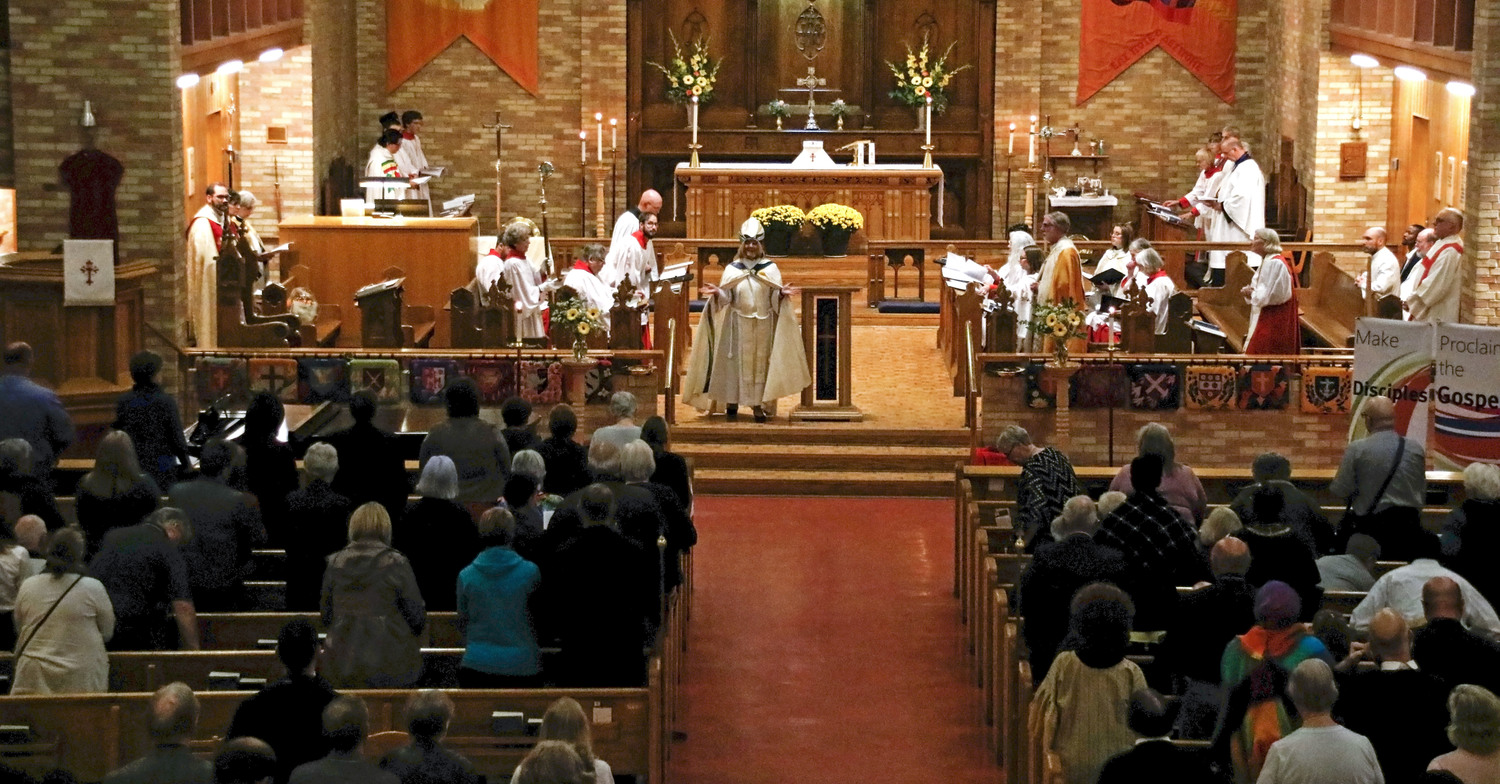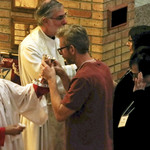PDF Fr. Michael Lapsley's Sermon to 66th Synod
“This is my vision for our churches: that they become places of belonging, places of sharing, places of love." Jean Vanier, Befriending the Stranger
Members of the 66th Synod of the Diocese of Edmonton were called together on October 4 and 5, 2019 to share their efforts as individuals, parishes and as a diocese to shape communities of belonging through God’s love.
The Rt. Rev. Dr. Jane Alexander, Bishop of Edmonton, on hiatus from a six-week personal leave of absence to lead synod, presided over the Opening Eucharist on Friday evening, the Feast of St. Francis of Assisi. The service was held at All Saints’ Cathedral, Edmonton on Treaty 6 land, the traditional meeting ground and home of Indigenous Peoples, including Cree, Saulteaux, Blackfoot, Nakota Sioux and the Métis Nation.
Looking upward to scarlet red dresses which were hung throughout the sanctuary, Bishop Jane called for a moment of silence to honour the lives of missing and murdered Indigenous women and girls. Every October 4th Sisters in Spirit vigils are held across Canada to support grieving families, provide opportunities for healing and motivate change. Just days earlier, National Anglican Indigenous Archbishop Mark MacDonald called for prayer as the names of 2,800 children who died attending residential school were shared in a public ceremony and members of the diocese wore orange shirts as a sign of their commitment to help heal the wounds caused by the Residential School system.
Bishop Jane prayed for the “healing of our souls”; that we may strive to be a place of belonging for all people; a sharing and loving community that participates fully in God’s dream for Mother Earth; in God’s dream for humanity.
Guest preacher Fr. Michael Lapsley SSM, who had been installed as Canon for Healing and Reconciliation at the 65th Synod, brought “a loving embrace” from the people of St. George’s Cathedral in Cape Town, South Africa, where he holds a similar title.
“Indeed we are all God's gift to the Church,” he said in his sermon to the congregation of 201 registered lay and clergy synod delegates, and guests. “But do we believe it in our heart of hearts?”
“How many of us have unhealed wounds especially from childhood. Often such wounds have affected our sense of self value and our ability to believe in our heart of hearts that we are God's children. With God's help, we can become healers of one another so that we experience ourselves in the innermost part of our being as God's children.”
Prior to the current synod 20 members of the Edmonton diocese participated in Fr. Lapsley’s Healing of Memories Residential Workshop - facilitated by his colleague Philani Dlamini, the Ven. Travis Enright, Archdeacon for Indigenous Ministries; the Rev. Stephanie London, priest at St. Thomas, Sherwood Park and St. Columba, Beaumont; and the Rev. Quinn Strikwerda, vicar of All Saints’ Cathedral - at Providence Renewal Centre.
“Each of us took a step on the road to healing,” he said. “For some of us, it was just a gentle step; some saw more clearly their own unfinished business. For one or two it was a watershed, life-changing moment when we began to let go of our victimhood.”
Shortly after joining the Anglican religious order of the Society of the Sacred Mission (SSM) at the age of 17, Lapsley, who was raised in New Zealand, trained to be a priest and, following his ordination in 1973, was sent by the society to serve in South Africa.
As an undergraduate student and chaplain to three campuses (two black and one white) at Durban University, his mission to bring together students of all races was defined by a keen awareness of the relationship between faith and justice.
Fr. Lapsley says belonging to the Anglican Student Federation, the only Christian student organization that had not split racially in 1970’s South Africa, “gave us a taste of non-racialism; of being together as people, as students, as Christians, as Anglicans, which was very different from our experience of everyday life. We were shaped by our common experience of humanity: having fun together, praying together and falling in love together. It was in that context that there was ferment and debate about what was our role in relation to the injustice.”
He became active in the liberation movement in the mid-1970s when he witnessed school children being shot and killed in the streets for protesting having to learn in Afrikaans. This grave injustice prompted him to join the African National Congress (ANC) and, in time, he was appointed chaplain to the ANC.
In April, 1990, three months after ANC leader Nelson Mandela’s release from prison, Fr. Lapsley was at home in Harare, Zimbabwe, having just returned from a six-week speaking tour across Canada. He opened a package containing two religious magazines and a concealed bomb. He was severely burned by the letter bomb which destroyed both his hands and one eye.
“For the 14 years before the bomb went off, I had lived in the countries of southern Africa and I had travelled the world as part of the struggle against apartheid. During my recovery I received messages of prayer, love and support from people of faith, people of goodwill,” he said during a public conversation at St. Faith’s, Edmonton on October 2. “There were many people with me, walking beside me, and that was the vehicle God used to help make my bombing redemptive: to bring life out of death and good out of evil.”
Working alongside other victims of terror, Fr. Lapsley helped create the International Network for Peace to promote effective and nonviolent solutions to terrorism. In 1993, he became Chaplain of the Trauma Centre for Victims of Violence and Torture in Cape Town, which assisted the country’s Truth and Reconciliation Commission (1996-1997). This work led to the establishment of the Institute for Healing of Memories in 1998. The organization now works with vulnerable groups; people affected by political violence; infected by HIV and AIDS; refugees and asylum seekers; prisoners and war veterans.
When Bishop Jane met Fr. Lapsley, in 2010, at a conference for peace and reconciliation in Seoul, South Korea, she recalls being amazed by his courage to raise “hot button” issues, such as capital punishment and the church’s treatment of LGBTQ2S+ people.
“Here we must ask ourselves, ‘what is God's dream for the Diocese of Edmonton?’” he told synod.
“While Indigenous people, the foundation nations of the human family have never lost sight of living in harmony with Mother Earth, in Alberta the politics and culture of the province have been closely tied to the production of fossil energy since the 1940s. One of our challenges is how to talk about environmental justice and the future of our children and grandchildren.....to do so will require guidance and wisdom and courage. So often throughout history, God chooses the most unlikely people as messengers. Who could have imagined that Greta, a 16-year-old Swedish girl with Asperger syndrome, would become the world's leading advocate for climate justice?”
“Bishop Jane’s visionary leadership has encouraged all of us to share in God's dream of a church in which All God's Children are welcome,” he said. “And that every parish and every congregation will become safe places where ancient, old and recent wounds can heal.”
“So let justice roll down like waters, and righteousness like an ever-flowing stream.” Amos 5:24
Caption: Fr. Michael Lapsley, Canon for Reconciliation and Healing, gives the sermon for the 66th Synod Opening Eucharist, encouraging members of Edmonton diocese to "share in God's dream."























































